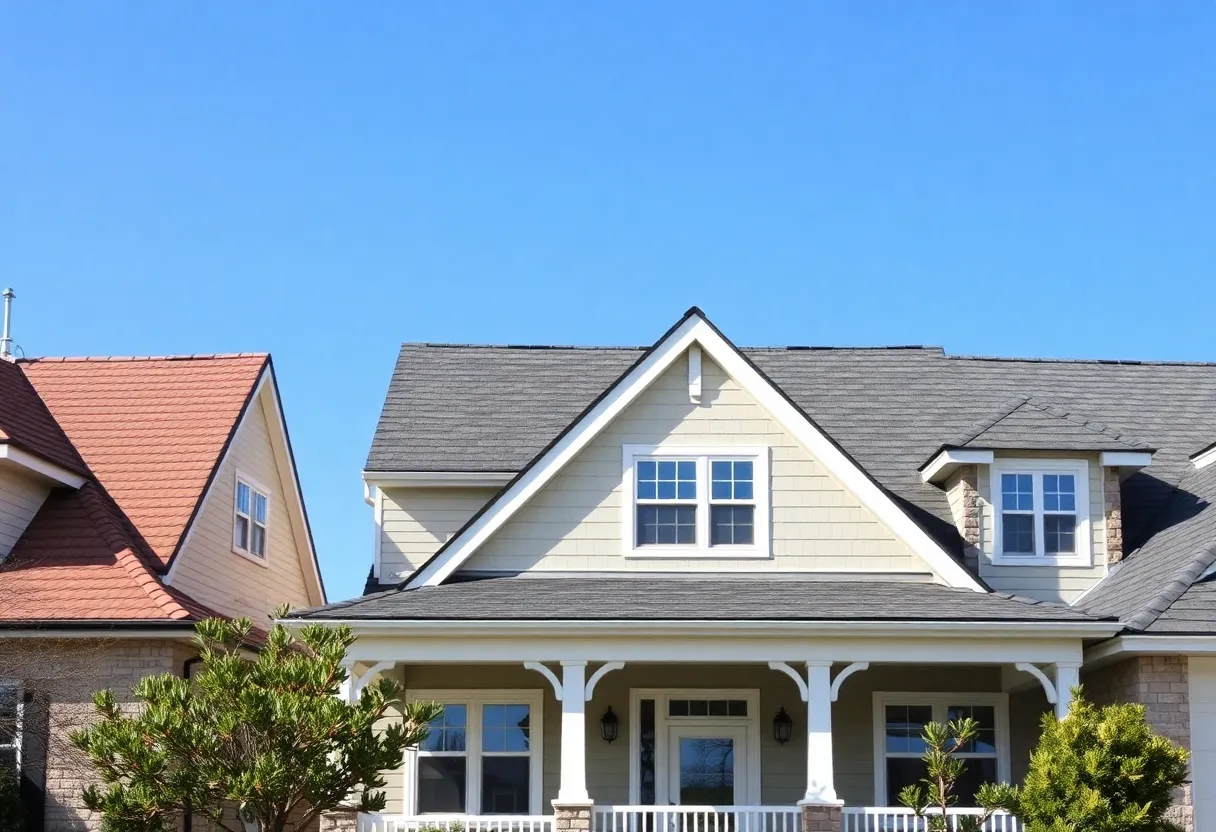

Exploring different roof designs enhances both aesthetics and functionality.
Article Sponsored by:
Mays Contracting is more than just a roofing company; it’s a family legacy built on trust and quality. Founded in 1979, we’ve been serving the community for over four decades. Our story began with a simple vision: to provide exceptional roofing services for both residential and commercial properties. This vision has guided us ever since, as we’ve grown from a small, family-run operation to a trusted name in the industry.
Designing a roof is an intricate task that requires thoughtful planning and execution. A well-designed roof not only enhances the aesthetic appeal of a home but also safeguards it against environmental elements. This article offers essential tips for homeowners looking to master the art of roof design.
Before diving into specifics, homeowners should familiarize themselves with various roof types. Each style has its unique advantages and aesthetic implications.
A gable roof is one of the most common styles. It features two sloping sides that meet at a ridge, resembling a triangle. This design is economical, facilitates water drainage, and allows for good ventilation.
Hip roofs are also popular due to their sturdiness. They have slopes on all four sides, which makes them more wind-resistant. This roof type provides ample attic space, which can be valuable.
While less commonly seen in residential settings, flat roofs offer a modern aesthetic and can be used for various outdoor spaces. Proper drainage is essential to prevent water accumulation.
The choice of roofing materials significantly impacts durability, maintenance, and appearance. Evaluate the following options:
These are the most widely used materials due to their affordability and range of colors. They last approximately 20-30 years, making them a practical choice for many homeowners.
Metal roofs have gained popularity for their longevity and sustainability. They can last over 50 years and are highly resistant to extreme weather conditions.
For a more high-end look, tile and slate roofs are excellent choices. They offer exceptional durability, but installation costs can be significantly higher than other materials.
Modern homeowners are increasingly focusing on energy-efficient roof designs. Here are some strategies to enhance energy performance:
Proper insulation can prevent heat loss in winter and keep cool air inside during summer. This can significantly reduce energy costs.
Choosing reflective roofing materials can help lower cooling costs in warm climates. These roofs reflect sunlight rather than absorbing it, lowering indoor temperatures.
Effective roof ventilation is crucial in maintaining a comfortable home environment. Ridge vents or gable vents allow air circulation, reducing heat buildup.
The design of your roof should not only be functional but also aesthetically pleasing. Here are some key factors to consider:
Selecting the right color can significantly influence your home’s appearance. Darker colors absorb more heat, while lighter shades reflect it.
Your roof design should complement the overall architecture of your home. A traditional home may look better with a gable roof, while a modern home may benefit from a flat roof.
Well-designed overhangs can offer shade and protection from rain. Eaves should be wide enough to protect walls and windows.
Incorporating an effective drainage system is vital to prolonging the lifespan of your roof. Poor drainage can lead to water damage and increased maintenance costs. Consider the following:
Install adequately sized gutters to channel rainwater away from the house. Regular cleaning ensures they function properly.
For flat roofs, consider a proper drainage system that directs water away efficiently. This is crucial in preventing pooling, which can lead to leaks.
Ensure that the roof has a proper slope to facilitate drainage. The minimum slope for residential roofs typically ranges from 2:12 to 4:12.
Every roof requires maintenance to ensure longevity and performance. Homeowners should consider the following:
Conduct regular inspections to identify potential issues before they escalate. Look for signs of wear, missing shingles, or leaks.
Keep your roof and gutters clean. Remove debris and ensure there’s no buildup that could cause blockages or damage.
Hire professionals for a comprehensive roof evaluation every few years. They can identify structural issues that may not be readily apparent.
Every region has specific building codes governing roofing practices. Understanding these regulations can save homeowners time and money:
Local zoning regulations may affect roof height, materials, and overall design. Ensure you comply with these standards.
Most jurisdictions require permits for major roofing projects. Obtaining the necessary approvals is crucial to avoid fines.
Be aware of how your roofing choices can affect your homeowners’ insurance premiums. Some materials may qualify for discounts.
No matter how skilled a homeowner may be, engaging with professionals can offer valuable insights:
For extensive projects, consulting with an architect can help in achieving the desired aesthetic while adhering to building codes.
Choose an experienced roofing contractor with a proven track record to ensure quality workmanship. Verify references and past projects.
Seek quotes from various contractors to understand market rates. This will help in making informed decisions.
Mastering roof design involves understanding the right materials, styles, and techniques that align with your home’s aesthetic and functional needs. By considering energy efficiency, implementing proper drainage, and engaging with professionals, you can ensure a durable, attractive, and efficient roof that stands the test of time. Proper planning and maintenance will ultimately lead to a roof that not only enhances your home but also protects it.

Quality Roof Construction and Repair in Lexington, Richland, Newberry and Laurens Counties for over 40 Years.
News Summary Governor Tim Walz and legislative leaders in Minnesota unveiled a bipartisan budget agreement…
News Summary A Texas mother, Ashley Pardo, faces terrorism charges for allegedly buying tactical gear…
News Summary Former FBI Director James Comey has sparked controversy after posting an Instagram photo…
News Summary The Supreme Court is considering whether a district judge can block the Trump…
News Summary Professional golfer Wesley Bryan and his wife Elizabeth Gray celebrate twelve years of…
News Summary Wesley Bryan has been suspended from the PGA Tour following his participation in…